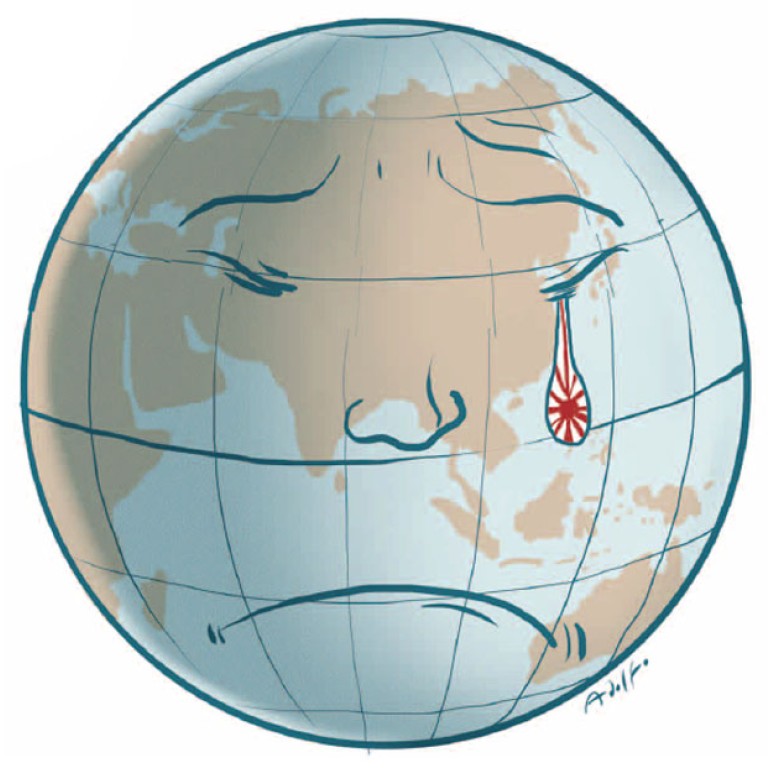
Abe's Yasukuni visit shows Japan has no remorse over wartime aggression
Song Zhe says Japan's relations with China and the rest of Asia cannot start afresh unless and until its leaders show true remorse for - and accurate understanding of - its wartime acts
Hong Kong, known as the "Pearl of the East", is a world city of prosperity. One could hardly imagine what happened here 70 years ago, when the city was ravaged by war. Hong Kong was under Japanese invasion and occupation for three years and eight months, during Japan's war on the region.
In those years, the suffering caused by Japan's invasion and expansion went far beyond a few cities. In the war against Japanese aggression, tens of millions of people lost their lives in China; the casualties and loss of property were countless. The cruelty of Japanese invaders covered almost the whole of Asia, and the suffering inflicted on the people of victim countries was beyond estimation.
Nearly 70 years have passed since the end of that war. But Asia will not be able to turn this page of history if the aggressor does not have an accurate understanding of this wartime aggression and has no feelings of remorse.
How to understand history is always a major political issue in Japan's relations with China, South Korea and other war victims in Asia.
In Japan, the consensus regarding remorse for past aggressions is not as broad as in Germany. But Japan's leader, as an embodiment of the will of the state, cannot say it is a matter of "internal affairs" and use this as an excuse to explain his behaviour with regard to understanding history. Because of this, the decision whether or not to visit the Yasukuni shrine, where convicted second world war criminals are honoured and worshipped, is not only a sensitive issue in Japan; it is also an issue of major importance watched closely by the people in the victim countries in Asia, and by the international community.
The rolling back of history by Japanese right-wingers offends the whole world’s conscience
One year after Shinzo Abe became prime minister of Japan for the second time, he visited the Yasukuni shrine, with no regard for the strong opposition from the Chinese government, bringing to the fore this major political issue after seven years of rest. Abe claimed afterwards that he made the visit out of remorse for the past and for "continued peace".
Such thinking can never be a justification for the people of the victim countries in Asia and in terms of international justice. This has been proven by the international community's strong reaction to Abe's behaviour.
Yasukuni was seen as a symbol of dedication to the emperor. As such, it played a role in boosting morale for invasion and expansion.
To this day, war criminals are glorified as "heroes" and "martyrs". In the shrine, past invasions are distorted, militarism is beautified and an absurd historical outlook - such as invasion having a higher purpose - is trumpeted.
But justice comes from the human conscience. The international community has long ago drawn its conclusions about the crimes of Japanese militarism and the responsibilities of war criminals. The International Military Tribunal for the Far East handed down just judgments and sentences on 14 Class-A war criminals; they were the leaders who waged war and on their hands was the blood of the people in the victim countries. They were Asia's Nazis. The rolling back of history on this particular issue by Japanese right-wingers offends the whole world's conscience.
Abe should know the sensitive nature of the Yasukuni issue. Still, he took this adventurist step. His actions show he is not sincere in his remorse for this wartime aggression, and he lacks an accurate historical outlook, which is necessary to see sense. His so-called remorse for the past and commitment to relations with China are a disguise. Through his actions, he is in fact questioning the legitimacy of the Tokyo Trials. Abe's veneration of Class-A war criminals is a sacrilege to the souls of those who sacrificed their lives in the fight against fascism in Asia and elsewhere.
If we also consider that, in the past year, Abe has been talking much about amending the constitution and about a military build-up, we cannot but feel worried. Where will Abe lead Japan? Can Japan live in peace with its neighbours? Will past tragedies be repeated in Asia?
One should take history as a mirror and look to the future. This is not to continue hatred, but to prevent a repeat of past tragedies. We hope Abe will have a correct understanding of, and deep remorse for, Japan's military aggression and colonial history, change course and win the trust of his Asian neighbours, rather than slipping further down the opposite road.
Today, peace and development are ideals to be found deep in the hearts of the Asian people. Asia on the whole is prosperous and growing. But the attempt of a few people in Japan to roll back the history of aggression is a countercurrent that should not be overlooked, because peace does not come easily.
